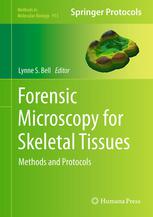

Most ebook files are in PDF format, so you can easily read them using various software such as Foxit Reader or directly on the Google Chrome browser.
Some ebook files are released by publishers in other formats such as .awz, .mobi, .epub, .fb2, etc. You may need to install specific software to read these formats on mobile/PC, such as Calibre.
Please read the tutorial at this link: https://ebookbell.com/faq
We offer FREE conversion to the popular formats you request; however, this may take some time. Therefore, right after payment, please email us, and we will try to provide the service as quickly as possible.
For some exceptional file formats or broken links (if any), please refrain from opening any disputes. Instead, email us first, and we will try to assist within a maximum of 6 hours.
EbookBell Team

4.1
60 reviewsForensic anthropology deals with human remains usually in the skeletonized form. The application of microscopy to skeletal tissues is well established and used routinely in biomedical science. Its adaptation to forensic questions is an increasing area of interest, and publications utilizing microscopy have increased in the scientific literature. In Forensic Microscopy for Skeletal Tissues: Methods and Protocols, expert researchers in the forensic, archeological and paleontological disciplines, and detail many of the methods which are now commonly used to study skeletal material. These methods include differing forms of light, confocal, scanning electron and transmission electron microscopy. Written in the highly successful Methods in Molecular Biology™ series format, chapters include introductions to their respective topics, lists of the necessary materials and reagents, step-by-step, readily reproducible laboratory protocols, and key tips on troubleshooting and avoiding known pitfalls.
Authoritative and practical, Forensic Microscopy for Skeletal Tissues: Methods and Protocols bring together differing forms of microscopy that are used in association with forensic anthropology, or have relevance to questions concerning forensic anthropology.